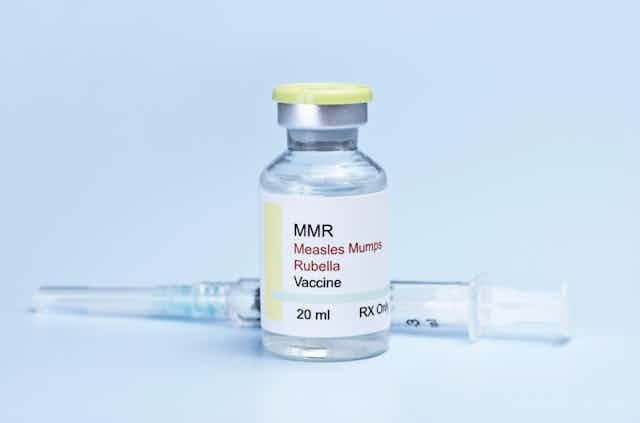Since the start of 2023, measles has been reported in a third of countries in the World Health Organization (WHO) European region. And in the first five months of the year, there were 5,699 cases reported there – nearly seven times as many as in the whole of 2022.
The UK lost its measles-free status in 2019, indicating that the measles virus was circulating and there was inadequate vaccination to prevent its spread. If exposed to the measles virus, 90% of unvaccinated people will get infected. The virus spreads like wildfire among the unvaccinated, as demonstrated recently when seven unvaccinated children at a nursery school in Stoke-on-Trent nursery caught the bug.
With the latest data from the UK Health Security Agency (UKHSA) showing at least one measles case in each region in England this year, and warnings of the potential for outbreaks in London, where else in the UK are children at risk? The short answer is probably “everywhere”.
Schools in all four devolved nations have now broken up for the summer holidays and people are travelling both in the UK and abroad and may encounter the measles virus on their travels. Eighty-one per cent of the 128 confirmed cases of measles in England so far in 2023 have been as a result of in-country community transmission.
There are no specific drugs for measles, so treatment is to help relieve symptoms and address complications, such as bacterial infections. For every 1,000 people infected, between one and three of them will die (deaths are highest in children under the age of five and those with weakened immune systems).
Deaths are commonly due to secondary bacterial infections. Pneumonia accounts for 60% of measles-associated deaths.
Other complications such as deafness, fits and encephalitis (brain inflammation) are relatively common. Around 25% of people who develop measles need hospital care.
But measles is a highly preventable disease, with two doses of the measles, mumps and rubella (MMR) vaccine protecting around 97% of people. In the UK, MMR is given as part of the routine childhood immunisation schedule, with dose one (MMR1) given around the age of 12 months, and MMR2 given as part of the pre-school boosters at age three years and four months.
Yet MMR levels across many parts of the UK fall far short of the 95% coverage needed for “herd immunity” against measles – where enough people are vaccinated that the virus is unable to spread. In the first quarter of 2023, UK-wide coverage for MMR2 by the age of five (that is, more than 18 months after it’s due) was just below 86% and no devolved nation had coverage above 90%.
While London has the lowest coverage for the same metric (at around 75%), only one of the other six NHS England regions had coverage above 90% (and even then, only just, at 90.5%).
There have always been pockets of populations with much lower-than-average levels of MMR coverage, but this has become much more complicated during the pandemic when disruptions to services in early waves meant that certain age groups may also have missed out on routine childhood immunisations.

For example, of the children attending a large paediatric emergency department in Greater Manchester, it was found that just 20% of four-year-olds had received both the required doses of MMR. This pattern is seen globally, with many countries yet to attain the levels of routine immunisation coverage they had pre-pandemic. During 2022, 21.9 million children missed their first dose of a measles vaccine – nearly 3 million more than in 2019.
Mumps and rubella – viruses also covered by the MMR vaccine – are also highly infectious diseases and can make children extremely ill. Complications include deafness and fits. But it’s never too late to catch up on a missed dose of the MMR vaccine.
In the UK, you can check your vaccinations with your GP surgery. There are some situations where older children and adults need to check they are up to date with their vaccinations, for example, if they are about to start university or travel abroad.
Adults in different age groups might also not be fully protected – for example, those who have been immunised according to the NHS schedule and were born between 1970 and 1979 may only be vaccinated against measles. And those born between 1980 and 1990 may not be protected against mumps.
But measles isn’t the only vaccine-preventable disease on the rise. Last year’s discovery of type 2 polio virus in London wastewater and reports of increased cases of diphtheria among a vulnerable population in England means that improving routine childhood vaccination coverage should be a priority.
For MMR, a national catch-up campaign is underway, and many regions have set up measles-elimination groups. If this work is successful, hopefully the UK will be able to regain its measles-free status.

